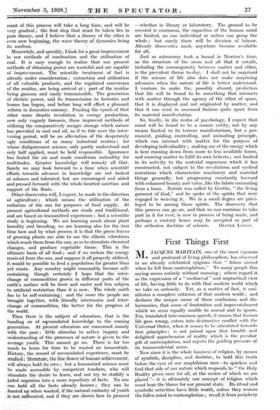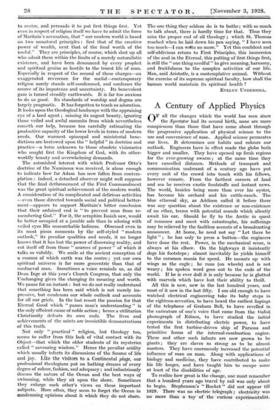First Things First
.m JACQUES MARITAIN, one of the most vigorous • and profound of living philosophers, has observed in an already. celebrated epigram that " Adam sinned when he .fell from contemplation." To many people this saying seems entirely without meaning ; others regard it as the expression of a " mediaeval." and unpractical view of life, having little to do with that modern world which . we take so seriously. Yet, as a matter of fact, it con- , stitutes a complete criticism of that modern world ; and declares the unique cause of those confusions and dis- . harmonies, that sense of frustration and impoverishment which we seem equally unable to amend and to ignore. . For, translated into common speech, it means that human life goes wrong, enters into destructive conflict with the Universal Order, when it ceases to be orientated towards first principles ; is not poised upon that humble and delighted apprehension of reality which is the peculiar gift of contemplation, and rejects the guiding pressure of its transcendental sense.
Now since it is the whole business of religion, by means of symbols, discipline, and doctrine, to hold this truth before the eyes of our amphibious race—to quicken and feed that side of our nature which responds to " the Holy Reality given once for all, at the centre of which we are placed "—it is ultimately our concept of religion which must bear the blame for our present state. Its ritual and symbolic activities have little worth, unless they restore the fallen mind to contemplation ; recall it from periphery to centre, and persuade it to put first things first. Yet even in respect of religion itself we have to admit the force of Maritain's accusation, that " our modern world is based on two unnatural principles : first that of the creative power of wealth, next that of the final worth of the useful." They are principles, of course, which shut up all who admit them within the limits of a merely naturalistic existence, and have been denounced by every prophet and spiritual genius as hostile to the truest life of man. Especially in respect of the second of these charges—an exaggerated reverence for the useful—contemporary religion surely stands self-condemned, and confesses the source of its impotence and uncertainty. Its benevolent gaze is turned steadily earthwards. It is far too anxious to do us good. Its standards of worship and dogma are largely pragmatic. It has forgotten to teach us adoration. It looks upon the theological landscape with the appraising eye of a land agent ; missing its august beauty, ignoring those veiled and awful summits from which nevertheless cometh our help, because too carefully estimating the productive capacity of the lower levels in terms of modern needs. Our warmest episcopal and ministerial bene- dictions are bestowed upon the " helpful" in doctrine and practice—a term unknown to those obsolete visionaries who sought first the Kingdom of God, with its other- worldly beauty and overwhelming demands. The astonished interest with which Professor Otto's doctrine of the Numinous was received, is alone enough to indicate how far Adam has now fallen from contem- plation : indeed, a detached observer might well suppose that the final dethronement of the First Commandment was the great spiritual achievement of the modern world. A consideration of its complicated and delirious activities —even those directed towards social and political better- ment—appears to support Maritain's bitter conclusion that their ordained end is " to prevent man from re- membering God." For it, the seraphim Isaiah saw, would be better occupied at a jumble sale than in adoring with veiled eyes His unsearchable holiness. Obsessed even in its most pious moments by the self-styled " modern outlook," its peculiar qualities and needs, it no longer knows that it has lost the power of discerning reality, and cut itself off from those " sources of power " of which it talks so volubly. We smile at the ancient conception of a cosmos of which earth was the centre ; yet our own spiritual universe is far more geocentric than that of mediaeval man. Sometimes a voice reminds us, as did Dean Inge at this year's Church Congress, that only the Unchanging gives the changing its meaning and worth. We pause for an instant : but we do not really understand that something has been said which is not merely im- pressive, but condemns our whole outlook and accounts for all our griefs. In the last resort the passion for that Eternal Good which " passes man's understanding " is the only efficient cause of noble action ; hence a utilitarian Christianity defeats its own ends. The lives and achievements of the saints are irresistible demonstrations of this truth. Not only " practical " religion, but theology too, seems to suffer from this lack of vital contact with its Object—that which the older students of its mysteries called " savouring wisdom." Hence the peculiar aridity which usually infects its discussions of the Source of life and joy. Like the visitors to a Continental plage, our professional theologians put on bathing dresses of every degree of colour, fashion, and adequacy ; and industriously discuss the nature of the Ocean and the best ways of swimming, while they sit upon the shore. Sometimes they enlarge each other's views on these important subjects. More often, they seem to forget the Ocean in condemning opinions about it which they do not share. The one thing they seldom do is to bathe ; with so much to talk about, there is hardly time for that. Thus they miss the proper end of all theology ; which St. Thomas reached when he laid down his pen saying, " I have seen too much—I can wi4te no more." Yet this confident and self-oblivious return to First Principles, this immersion of the soul in the Eternal, this putting of first things first, is still the " one thing needful " to give meaning, harmony, and fruitfulness to the complex activities of our life. Man, said Aristotle, is a contemplative animal. Without the exercise of its supreme spiritual faculty, how shall the human world maintain its spiritual health ?
EVELYN UNDERILILL.



















































































































 Previous page
Previous page